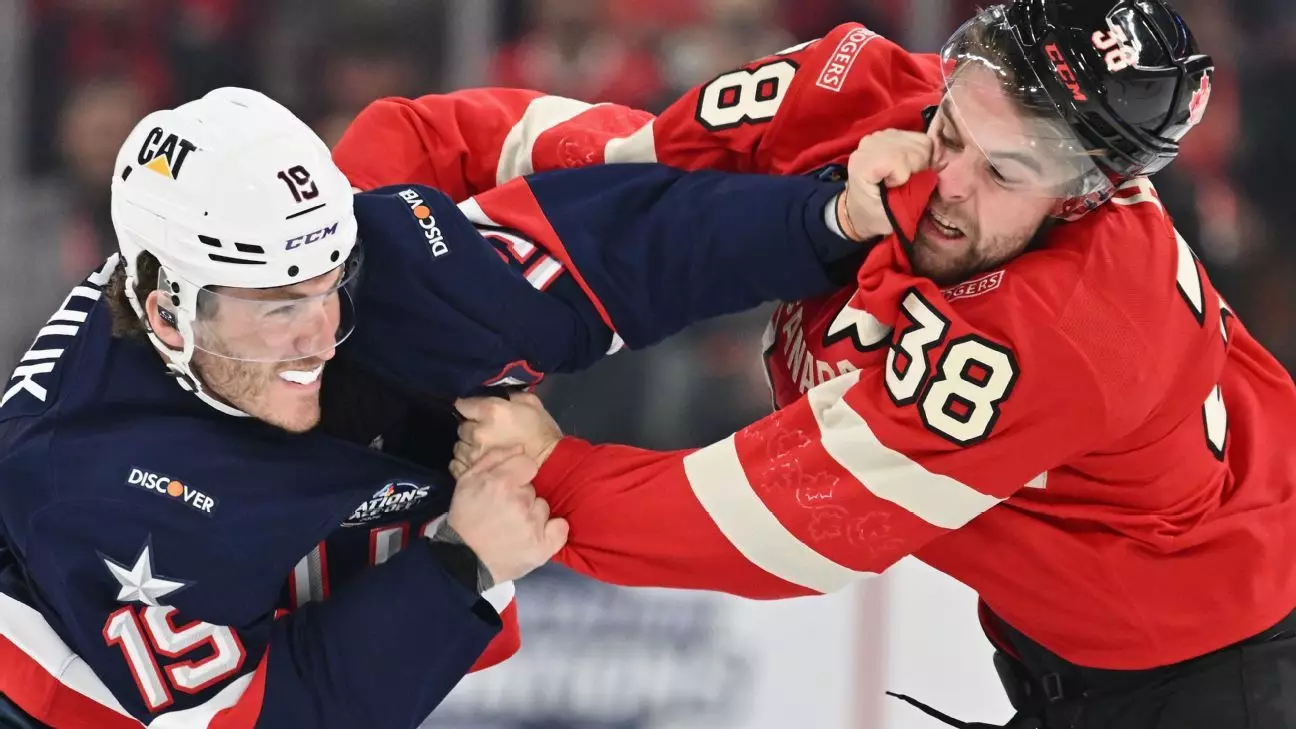The recent clash between Team USA and Canada at the NHL 4 Nations Face-Off has made waves both on and off the ice. With anticipation building, the matchup culminated in an electric 3-1 victory for the U.S., marking a crucial moment for hockey that resonated with fans across North America. The event not only brought together generations of elite NHL players representing their countries but also rekindled a passion for international competition that had been largely dormant since 2016.
Described by Canada’s head coach Jon Cooper as a pivotal event in hockey history, the game attracted an astounding 5.4 million viewers, showcasing the growing interest in international hockey. Fans flocked to witness a rare and thrilling display of talent as players like the Tkachuk brothers and J.T. Miller showcased their skills, marking their territory not only as athletes but as passionate representatives of their nations.
What transformed this game from a mere sporting event into a spectacle of emotion was the charged atmosphere that preceded it. The pre-game booing of the U.S. national anthem by Montreal fans—stemming from local protests against a backdrop of political tensions—set the stage for an intense showdown. The opening bell was a frenzy of action, with a staggering three fights breaking out within the first nine seconds of the game. This unprecedented aggressiveness emphasized a primal aspect of hockey that attracts both ardent supporters and skeptics of the sport.
The significance of this electrifying atmosphere was not lost on players or coaches. USA’s Matthew Tkachuk’s record-setting fight immediately off the face-off epitomized the fierce rivalry and competitive spirit dominating the evening. Canada’s Travis Konecny later articulated how the presence of national flags could ignite an intensity rarely seen in other sports, highlighting hockey’s unique culture where fighting is still a viable aspect of gameplay.
Though fighting often invites criticism in hockey circles, Cooper offered a compelling defense by stating that it served as a catalyst for the game. „This is what you get when the best players in the world are engaged in not just scoring, but also physically asserting themselves,“ he asserted, reflecting on the game’s pace and intensity. Such fierce competition created a palpable tension that kept spectators on the edge of their seats throughout the entire match.
As the game unfolded, it became more than a mere contest between two teams; it became a reflection of what international hockey could and should be. Players like Jack Hughes and Vincent Trocheck noted that the 4 Nations Face-Off eclipsed typical All-Star Game experiences, fostering a level of intensity comparable to playoff hockey. This sentiment aligns with the desire among fans for a return to high-stakes, competitive gameplay that fuels their love for the sport.
Moreover, the success of the event raises questions about the future of international play and the potential to inspire younger generations. Coaches and players alike have recognized that hockey needs exhilarating events like this to propel the sport forward, similar to historic moments like the 1980 “Miracle on Ice.” These games can spark a passion for the game among young players and provide them with role models in the form of elite athletes striving to represent their countries.
As Team USA prepares to face Sweden in the upcoming rounds, the fallout from the USA-Canada showdown has already garnered attention from media outlets and fans eager to see how this rivalry unfolds. The sentiments expressed by players on both sides emphasize the importance of national pride, intensity, and the overwhelming spirit of competition, casting a bright light on the future for international hockey.
With the tournament still unfolding, one can only hope that the excitement, passion, and sheer talent displayed in this game serve as a template for future international events. The combination of elite skills and emotionally charged encounters can draw fans back to hockey, reigniting a love for the game that has been difficult to maintain in recent years.
The New NHL 4 Nations tournament is more than just a series of games; it represents a pivotal awakening for the sport itself—an opportunity to reestablish its roots while reaching for ambitious new heights. As the championships progress, the narrative will undoubtedly continue to develop, promising to deliver dramatic finishes, nail-biting competition, and a reminder of why international hockey is worth celebrating.


Napsat komentář